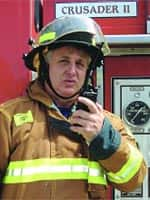Life Extension Magazine®
Firefighter Jerry Buechler has battled blazes with heavy roof beams crashing down around him, helping comrades escape the metal-buckling heat of an inferno. He recalls the massive Fontana Hotel fire in Miami Beach in April 1990, which killed nine people and injured 24 others, including four firefighters. It was the worst blaze he has ever fought in more than 20 years of serving the public in Miami. Jerry has spent his career helping individuals, but he also hopes to make a mark on society. To that end, he considers himself an activist, someone who takes action for what he regards as both the greater personal good and the greater social good. He is just as comfortable discussing his philosophical views as he is talking about firefighting. “Society is made up of individuals, and it’s the state of consciousness and health of those individuals that makes up the state of consciousness and health of the whole,” he says. “I believe that real activism focuses on the individual, and what he can do to optimize his health and consciousness. It’s about making small changes to help effect larger change.” Advocating for Health FreedomJerry puts his personal philosophy into practice as an activist for freedom of choice in health care. As an agent and consultant for his union’s self-funded health plan, which insures more than 800 members and over 2,000 of their dependants, he recently gained coverage for preventive medical scans and integrative treatments such as acupuncture and chiropractic services. Buoyed by those successes—and by personal experience in improving his own health using Life Extension products—Jerry is now petitioning the plan to offer coverage for supplements. However, gaining approval will not be easy, he says. Although some of the fund’s trustees are open to the idea, other trustees and the fund’s attorney are expressing some reluctance. “They’re concerned about the appearance of endorsing unproven treatments,” Jerry explains. “But I think there’s a fine line between offering people options, which is allowing freedom of choice, and endorsing something. This point still needs to be resolved, but I’m optimistic and can see the possibility of it happening.” Jerry became interested in complementary medicine and nutritional supplements in the late 1990s, when he discovered Life Extension magazine while sitting in his doctor’s waiting room. He took the magazine home with him and soon joined the Life Extension Foundation. Many of his colleagues have come to share his enthusiasm for the life extension philosophy of promoting optimal health. Firefighters want and need to be physically fit because of the demands of the job. Most are nutritionally conscious and many take supplements, according to Jerry. “Today, we’re much more conscientious about the effects of diet on health than when I first became a firefighter in 1985,” he says. “There’s less red meat consumed in the evening meal at the station house than there used to be. When it’s my turn to cook, I usually make salmon and a spring mix salad.” When his copy of Life Extension kept disappearing at the fire station, Jerry gained approval from the health fund’s trustees to order a subscription to the magazine and a copy of Disease Prevention and Treatment for all 15 fire stations in Miami Beach, Coral Gables, and Hialeah, FL. “Many firefighters are interested in the kind of information published in Life Extension, and I probably need to order more copies of the magazine,” he says. “Each station is manned by seven to 14 people, and the copies just keep disappearing.” Lowering Cholesterol NaturallyJerry credits his Life Extension membership and more than five years of reading the magazine for inspiring him to push for changes in the firefighters’ health plan, as well as helping him address his own medical concerns. Raised on what he calls “a typical German diet” of meat, potatoes, and sweets, Jerry switched gears in college, becoming a vegetarian and remaining so until eight years ago. When his school-age sons began demanding non-vegetarian fare, the family obliged, switching to a meat-based diet. Despite these dietary changes, Jerry has always considered himself the picture of health. An avid biker, he typically rode 50 miles a week and played handball or tennis whenever he could. Last fall, however, during a routine physical exam, Jerry received some unsettling news: his cholesterol was 230 and his triglycerides were also high. “I’m sure that eating a typical American diet for eight years was responsible for my high cholesterol,” he says. “It’s high in fat and lacking in fiber. It’s also low in omega-3 oils.” His doctor offered to prescribe a statin drug, but Jerry was reluctant to take the medication after reading about statins in Life Extension. Most troublesome to him was how statins affect the production of CoQ10 in the liver. “In Canada, statins carry a warning label because they can affect the synthesis of CoQ10,” he notes. “It’s an energy factor for muscles and the heart. I didn’t want to take something with the potential side effect of muscle weakness.” Armed with information from Life Extension, Jerry told his doctor that he wanted to try a nutritional therapy first. As it happens, he then received a serendipitous phone call from the Life Extension Foundation: “They were calling the membership to recruit participants for a study of fish oil and sesame lignans. I fit the profile they wanted: males in their forties and fifties.” Jerry agreed to take part in the study. After initial blood testing, participants were instructed to take four softgels of Super EPA/DHA with Sesame Lignans each day. After three weeks, Jerry had his blood re-tested and was amazed at the results: his total cholesterol had plummeted to 168, and his triglycerides were nearly halved. Something else caught his attention as well. “Super EPA/DHA with Sesame Lignans costs around $20 a bottle and lasts a month,” Jerry says. “Statin drugs cost about $100 for a month’s supply. The EPA/DHA was even cheaper than what my co-pay would have been for the statin, which is $30. But the health plan would have had to pay another $70 for the statin, and that’s my money, too, when you’re talking about a self-insured fund.” Jerry’s success with Super EPA/DHA led him to begin more supplementation. He has now added a multi-vitamin, 2000 mg of vitamin C per day, nutritional yeast mixed with orange juice, and a broad-spectrum antioxidant product. He occasionally takes timed-release melatonin, and is now researching lipoic acid and acetyl-L-carnitine, with plans to add those nutrients to his regimen. Pushing for Broader ChangeThe health and cost benefits of nutritional supplements compared to statin drugs spurred Jerry to propose that his health plan offer coverage for supplements. He was particularly concerned for retired Coral Gables firefighters, who must pay full premium for their health coverage when city contributions stop. These retirees experience sticker shock when they discover the true cost of their premiums. “Firemen retire early, before Medicare kicks in, and they have to carry the full cost of their health coverage for many years,” Jerry explains. “Being able to choose an alternative treatment and take less costly but effective supplements can help control overall fund costs.” Costs aside, the health plan’s primary concern is to keep everyone healthy. Gaining coverage for preventive medical scans has already had a positive impact, according to Jerry. Under workers’ compensation law, many conditions are considered job-related if diagnosed while a firefighter is an active employee. “Cholesterol problems aren’t covered, but a blockage is,” Jerry says. “Since we’ve added this coverage, several firefighters discovered they had significant calcification, and have since gone on protocols or statins to keep that stable.”
Jerry would like to see the fund also cover treatments from hospitals that practice truly integrative medicine, combining traditional treatments with sound nutrition. This idea came about when a union member with untreatable cancer wanted to try alternative therapies. Other union members have asked Jerry about integrative treatments for themselves or family members. “We’re supposed to be in a free-choice society, so people should have a choice of treatments,” Jerry says. “We now have a $500 annual benefit for acupuncture, with the plan paying 80%. I’d like to see a similar benefit for supplements, perhaps starting with 50% coverage.” Whether Jerry’s activism will catch on at the national level remains to be seen. The national firefighters union has other important priorities, and offering more health care options is not high on the list. Yet Jerry is hopeful that this will eventually change. “So many great leaders have said that if you want to change the world, begin by changing yourself,” he adds. “If more individuals take the initiative, then greater change will come about.” |


